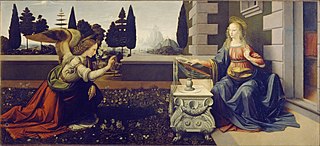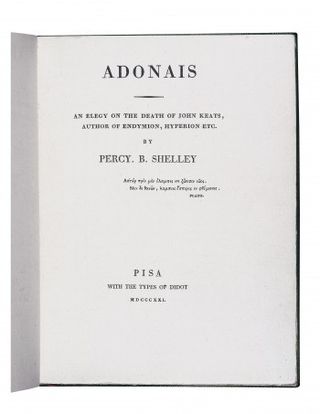Related Research Articles

In the Abrahamic religions, Gabriel is an archangel with the power to announce God's will to humans. He is mentioned in the Hebrew Bible, the New Testament, and the Quran. Many Christian traditions – including Catholicism, Eastern Orthodoxy, Lutheranism, and Anglicanism – revere Gabriel as a saint.

James Henry Leigh Hunt, best known as Leigh Hunt, was an English critic, essayist and poet.
Rhyme royal is a rhyming stanza form that was introduced to English poetry by Geoffrey Chaucer. The form enjoyed significant success in the fifteenth century and into the sixteenth century. It has had a more subdued but continuing influence on English verse in more recent centuries.
"I Vow to Thee, My Country" is a British patriotic hymn, created in 1921 when music by Gustav Holst had a poem by Sir Cecil Spring Rice set to it. The music originated as a wordless melody, which Holst later named "Thaxted", taken from the "Jupiter" movement of Holst's 1917 suite The Planets.

"The Lamb" is a poem by William Blake, published in Songs of Innocence in 1789.

Adonais: An Elegy on the Death of John Keats, Author of Endymion, Hyperion, etc. is a pastoral elegy written by Percy Bysshe Shelley for John Keats in 1821, and widely regarded as one of Shelley's best and best-known works. The poem, which is in 495 lines in 55 Spenserian stanzas, was composed in the spring of 1821 immediately after 11 April, when Shelley heard of Keats' death. It is a pastoral elegy, in the English tradition of John Milton's Lycidas. Shelley had studied and translated classical elegies. The title of the poem is modelled on ancient works, such as Achilleis, an epic poem by the 1st-century AD Roman poet Statius, and refers to the untimely death of the Greek Adonis, a god of fertility. Some critics suggest that Shelley used Virgil's tenth Eclogue, in praise of Cornelius Gallus, as a model.

"Hymn to Intellectual Beauty" is a poem written by Percy Bysshe Shelley in 1816 and published in 1817.

The Abou Ben Adhem Shrine Mosque is a building of arabesque design located in downtown Springfield, Missouri, United States. It was built in 1923 for a cost of $600,000. It is owned by the Abou Ben Adhem Shriners and for many years was the site of the annual Shrine Circus. The five-story building includes a large auditorium with seating for over 4,000. The name derives from Ibrahim ibn Adham, taken from the poem "Abou Ben Adhem" by Leigh Hunt.
"Cold Iron" is a poem written by Rudyard Kipling published as the introduction to Rewards and Fairies in 1910. Not to be confused with Cold Iron.

Ibrahim ibn Adham also called Ibrahim Balkhi ; c. 718 – c. 782 / AH c. 100 – c. 165 is one of the most prominent of the early ascetic Sufi saints.
— From Cantos 27 and 56, In Memoriam A.H.H., by Alfred Tennyson, published this year

"Infant Joy" is a poem written by the English poet William Blake. It was first published as part of his collection Songs of Innocence in 1789 and is the counterpart to "Infant Sorrow", which was published at a later date in Songs of Experience in 1794.

"A Death-Scene" is a poem by English writer Emily Brontë. It was written on 2 December 1844 and published in 1846 in a book collecting poetry by Brontë and her siblings.
"Come hither child" is a poem written by the English poet Emily Jane Brontë, one of the four Brontë siblings famous for literature in the first half of the 19th century. The poem was written on 19 July 1839. It is set in the imaginary realm of Gaaldine, referring to Ula, a province of Gaaldine.
"Angelus ad virginem" is a medieval carol whose text is a poetic version of the Hail Mary and the Annunciation by the archangel Gabriel to the Virgin Mary.
A masculine ending and feminine ending or weak ending are terms used in prosody, the study of verse form. "Masculine ending" refers to a line ending in a stressed syllable. "Feminine ending" is its opposite, describing a line ending in a stressless syllable. This definition is applicable in most cases; see below, however, for a more refined characterization.
The Vision of Judgment (1822) is a satirical poem in ottava rima by Lord Byron, which depicts a dispute in Heaven over the fate of George III's soul. It was written in response to the Poet Laureate Robert Southey's A Vision of Judgement (1821), which had imagined the soul of king George triumphantly entering Heaven to receive his due. Byron was provoked by the High Tory point of view from which the poem was written, and he took personally Southey's preface which had attacked those "Men of diseased hearts and depraved imaginations" who had set up a "Satanic school" of poetry, "characterized by a Satanic spirit of pride and audacious impiety". He responded in the preface to his own Vision of Judgment with an attack on "The gross flattery, the dull impudence, the renegado intolerance, and impious cant, of the poem", and mischievously referred to Southey as "the author of Wat Tyler", an anti-royalist work from Southey's firebrand revolutionary youth. His parody of A Vision of Judgement was so lastingly successful that, as the critic Geoffrey Carnall wrote, "Southey's reputation has never recovered from Byron's ridicule."

"The Little Boy Found" is a poem by William Blake first published in the collection Songs of Innocence in 1789. Songs of Innocence was printed using illuminated printing, a style Blake created. By integrating the images with the poems the reader was better able to understand the meaning behind each of Blake's poems.
Islam uses a number of conventionally complimentary phrases praising Allah, or wishing good things upon Muhammad or other prophets and chosen figures of God. These phrases are encompassed by a number of terms: Prayers upon Muhammad may be referred to simply as Arabic: صَلَوات, romanized: ṣalawāt, "prayers", Persian: درود, romanized: dorud, "greetings", or Urdu: درود, romanized: durūd.
"On the Death of Mr. Crashaw" is an elegy by English poet Abraham Cowley in commemoration of his friend Richard Crashaw's death. First published in 1656, it is considered by literary critics as one of Cowley's greatest poems.
References
- ↑ "Abou Ben Adhem by Leigh Hunt". Poetry Foundation. 2021-10-14. Retrieved 2021-10-14.
- ↑ "Poetry By Heart | Abou Ben Adhem" . Retrieved 2021-10-14.
- 1 2 Jones, Russell (1997). "Leigh Hunt's Oriental Motifs: Abou Ben Adhem". Journal of the Royal Asiatic Society. 7 (3): 389–397. ISSN 1356-1863.
- ↑ "LitCharts". LitCharts. Retrieved 2021-10-14.
- 1 2 3 "Bonhams : HUNT (LEIGH) Autograph manuscript of his poem 'Abou Ben Adhem', 1855". www.bonhams.com. Retrieved 2021-10-14.
- 1 2 "Abou Ben Adhem Summary | Englicist". englicist.com. Retrieved 2021-10-14.
- ↑ "T. Rees Shapiro, "Irwin Corey, 102: Comedian Billed Himself as 'World's Foremost Authority'". Washington Post. February 8, 2017.
- ↑ "Appendix I: List of Prescribed Textbooks". Indian Certificate of Secondary Education Examination, Year 2021. Retrieved 10-5-2022.